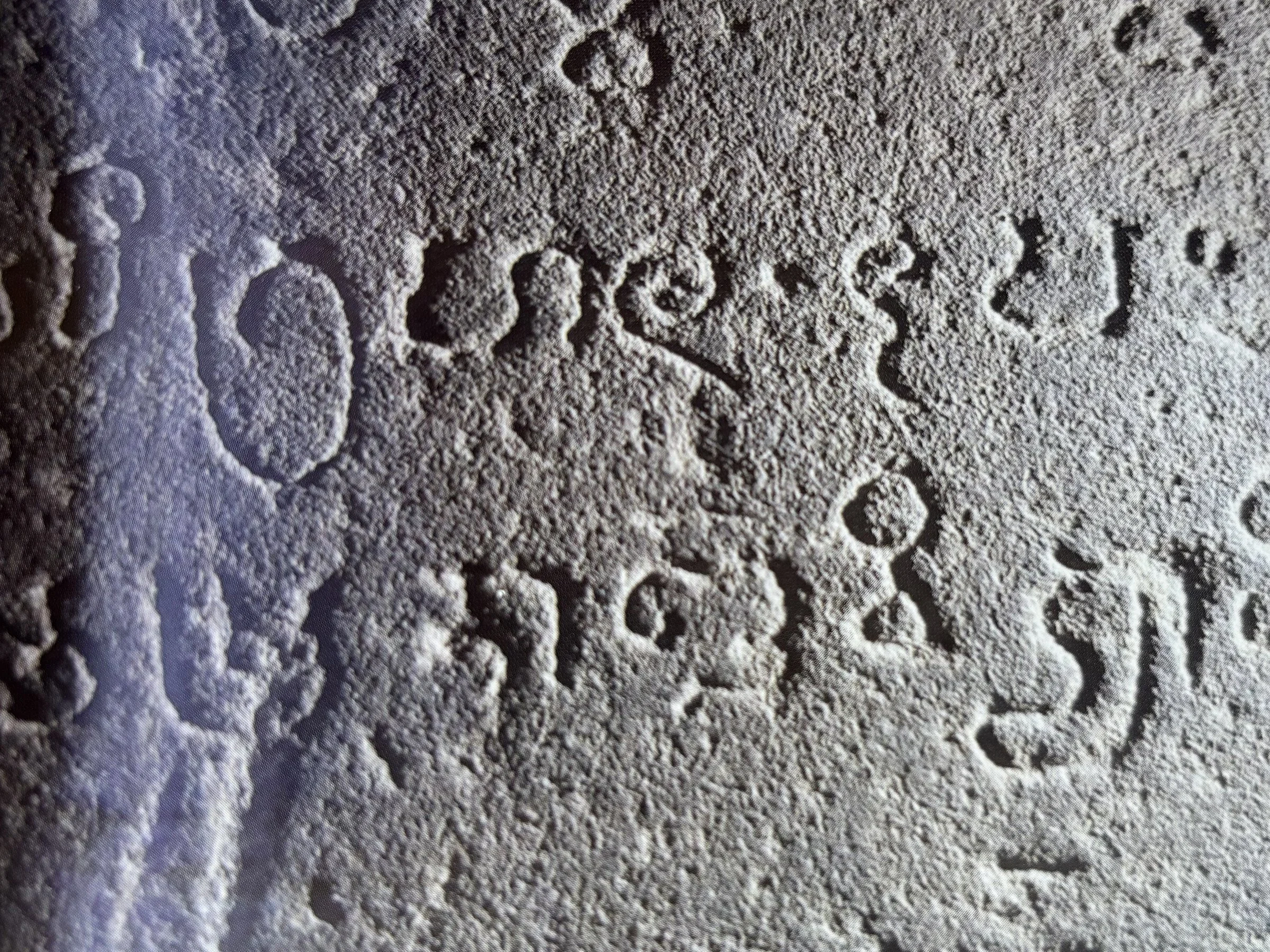DESI DIARY
ALL THE INCREDIBLE THINGS ANCIENT INDIA HAS GIVEN US
This 683 CE inscription found at Sambor Prei Kuk in Cambodia is generally acknowledged to have oldest dated zero in the world. It’s the dot between the ‘tadpoles’ in the middle of the top line. Image credit: The Golden Road by William Dalrymple.
By SHAGORIKA EASWAR
William Dalrymple was a little late for the lunch hosted in his honour by Toronto International Festival of Authors (TIFA) for patrons, donors and TIFA board members at York Club ahead of a sold-out event at the Isabel Theatre that same evening.
And yet, within minutes of arriving, he had everyone hanging on to every word. Affable and chatty, he said he was always late for everything. “Maybe that’s why I am so comfortable in India!” he remarked, tongue-in-cheek.
At his only stop in Canada, he was in town to launch his latest nook, The Golden Road, and hence the rest of the afternoon was spent in talking about many contributions India has made to the world – many of which we remain ignorant about.
Described as “A soaring history of India’s under-recognized role in producing the world as we know it,” it is a richly-detailed and meticulously researched account.
Dalrymple, in conversation with TIFA’s Artistic Director and CEO Roland Gulliver, spoke of how Indian art, religions, technology, astronomy, music, dance, literature, mathematics, and mythology blazed a trail across the world, along a Golden Road that stretched from the Red Sea to the Pacific.
How Indian mathematicians and astronomers like Aryabhatta and Brahmagupta were computing the stars long before others and yet we know more about Archimedes and Galileo than them.
“India gave the world the numerals and zero, the world knows of them as Arabic numerals. Algebra and algorithm evolved from al-jabr and the name of mathematician alkwarizmi, who took these ideas to the Arab world.”
But it wasn’t just the west that remained relatively oblivious to India’s contributions – those of us growing up in India and going through the Indian schooling system also studied a history from the perspective of British historians. Hence what we knew of as the Indian Mutiny is only now rightly referred to as the First War of Independence.
“China was far more successful in getting its story out, but the famous Silk Road we all know about is not ancient at all.”
India’s influence and power extended for vast swaths of the globe, creating “a vast empire of ideas” but it was a “soft export”.
“The largest Hindu temple in the world is not in India but in Angkor Vat. Even today, when you land in Thailand, you land at Suvarnabhumi airport. If you fly Indonesia’s airline, you fly Garuda, which, of course, is from the Ramayana. And Ma Ganga became Mekong.”
A guest asked why, with all those things to offer, India had fallen behind at the time of the industrial revolution.
Dalrymple said he didn’t quite agree that it had, in fact, fallen behind, pointing to the looms of Bengal that were producing the finest muslins and other textiles in the world during that very same period.
“But Britain had the stronger military might and that prevailed.”
Another wanted to know if it wasn’t a little strange that someone who was after all representative of the colonial powers that ruled India was now writing about India’s glory.
“Scotland’s history was best explored and written about not by a Scotsman, but by a Canadian!” responded Dalrymple. “There are many people writing about India, it’s a thriving community of authors – that’s why it’s such a pleasure to be there – but it’s also true that as an ‘outsider’ I notice things others don’t see or take for granted. Just like I don’t notice the red pillar boxes (mailboxes) or the double-decker buses when I am in London.”
And then he shared this astounding piece of information: Thanks to ancestry.com, William Dalrymple now knows that he is part Indian-Hindu and a small part Mi'kmaq, the Indigenous People of Eastern Canada!
A guest posed a “biographical” question: What brought Dalrymple to where he is now?
“The longest gap year ever!” he responded with a laugh. “I took a year off over 30 years ago and I’m still living it!”
The cofounder and codirector of Jaipur Literary Festival – billed as the largest litfest in the world – was equally modest about its success.
“We hold it in Jaipur, the incredible city of places, and we hold it in January – when the weather is awful in many parts of the world. Margaret Atwood and Ian McGowan are happy to come relax by the pool at a palace!”
His podcast Empire in which he explores the stories, personalities and events of empire over the course of history with Anita Anand (with whom he coauthored Kohinoor) has been a spectacular success.
The young who discovered the charms of India 30-plus years ago has come full circle and is now presenting India to the world.
TIFA has a full calendar of more such lively and enlightening presentations and talks year-round and at the upcoming Motive Crime and Mystery Festival in June, the main festival in October and the new TIFA Romance festival in November. For details, visit festivalofauthors.ca
The Golden Road: How Ancient India Transformed the World by William Dalrymple is published by Bloomsbury, $43.99.


